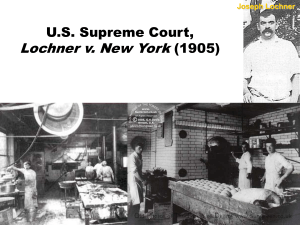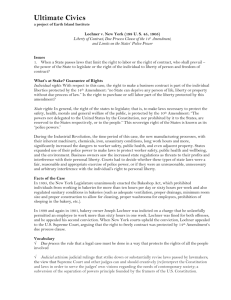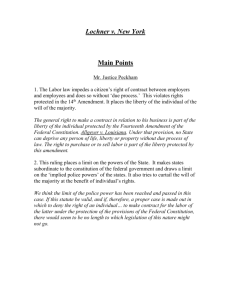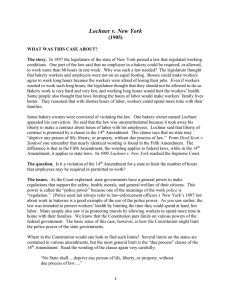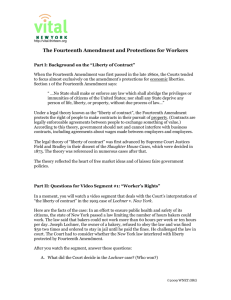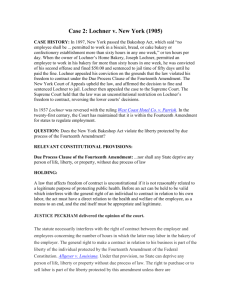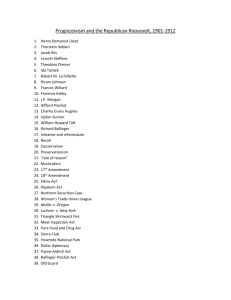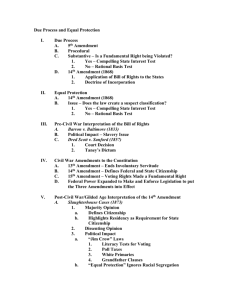Progressiveerapart2
advertisement
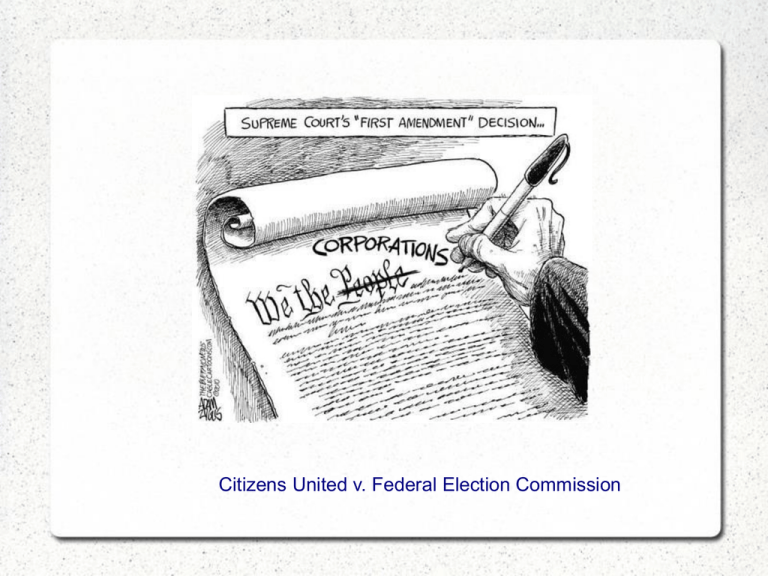
Citizens United v. Federal Election Commission The Fourteenth Amendment, 1866 All persons born or naturalized in the United States, and subject to the jurisdiction thereof, are citizens of the United States and of the state wherein they reside. No state shall make or enforce any law which shall abridge the privileges or immunities of citizens of the United States; nor shall any state deprive any person of life, liberty, or property, without due process of law; nor deny to any person within its jurisdiction the equal protection of the laws. Holden v Hardy 169 U.S. 366 (1898) • Is a law proscribing that "The period of employment of workingmen in all underground mines or workings shall be eight hours per day, except in cases of emergency where life or property is in imminent danger” a violation of the 14th Amendment? Holden v Hardy 169 U.S. 366 (1898) And Due Process • This court has never attempted to define with precision the words "due process of law," nor is it necessary to do so in this case. It is sufficient to say that there are certain immutable principles of justice which inhere in the very idea of free government which no member of the Union may disregard, [p390] as that no man shall be condemned in his person or property without due notice and an opportunity of being heard in his defence • Recognizing the difficulty in defining with exactness the phrase "due process of law," it is certain that these words imply a conformity with natural and inherent principles of justice, and forbid that one man's property, or right to property, shall be taken for the benefit of another, or for the benefit of the State, without compensation; and that [p391] no one shall be condemned in his person or property without an opportunity of being heard in his own defence. Holden v Hardy 169 U.S. 366 (1898) and The Police Power • The police power cannot be put forward as an excuse for oppressive and unjust legislation, it may be lawfully resorted to for the purpose of preserving the public health, safety or morals, or the abatement of public nuisances, Holden v Hardy 169 U.S. 366 (1898) and the Unique Hazards of Mining • we think the act in question may be sustained as a valid exercise of the police power of the State. The enactment does not profess to limit the hours of all workmen, but merely those who are employed in underground mines or in the smelting, reduction or refining of ores or metals. These employments, when too long pursued, the legislature has judged to be detrimental to the health of the employees, and, so long as there are reasonable grounds for believing that this is so, its decision upon this subject cannot be reviewed by the Federal courts. Lochner and Substantive Due Process • Can New York limit the hours of bakers? • Is such a regulation an exercise of the police power or an unconstitutional limit on the right of contract? Lochner v. New York (1905) • The statute necessarily interferes with the right of contract between the employer and employees, concerning the number of hours in which the latter may labor in the bakery of the employer. The general right to make a contract in relation to his business is part of the liberty of the individual protected by the 14th Amendment of the Federal Constitution. Under that provision no state can deprive any person of life, liberty, or property without due process of law. The right to purchase or to sell labor is part of the liberty protected by this amendment, unless there are circumstances which exclude the right. Limits of the Police Power • There are, however, certain powers, existing in the sovereignty of each state in the Union, somewhat vaguely termed police powers, the exact description and limitation of which have not been attempted by the courts. Those powers, broadly stated, and without, at present, any attempt at a more specific limitation, relate to the safety, health, morals, and general welfare of the public. Both property and liberty are held on such reasonable conditions as may be imposed by the governing power of the state in the exercise of those powers, and with such conditions the 14th Amendment was not designed to interfere. Police power v. Economic Liberty • In every case that comes before this court, therefore, where legislation of this character is concerned, and where the protection of the Federal Constitution is sought, the question necessarily arises: Is this a fair, reasonable, and appropriate exercise of the police power of the state, or is it an unreasonable, unnecessary, and arbitrary interference with the right of the individual to his personal liberty, or to enter into those contracts in relation to labor which may seem to him appropriate or necessary for the support of himself and his family? Of course the liberty of contract relating to labor includes both parties to it. The one has as much right to purchase as the other to sell labor. The Lochener Rule • “The act must have a more direct relation, as a means to an end, and the end itself must be appropriate and legitimate, before an act can be held to be valid which interferes with the general right of an individual to be free in his person and in his power to contract in relation to his own labor.” Labor law or police power? • [v]iewed in light of a purely labor law, with no reference whatever to the question of health, we think that a law like the one before us involves neither safety, the morals nor the welfare of the public, and that the interest of the public is not in the slightest degree affected by such an act The Holmes Dissent in Lochner • The 14th Amendment does not enact Mr. Herbert Spencer's Social Statics.... Some of these laws embody convictions or prejudices which judges are likely to share. Some may not. But a Constitution is not intended to embody a particular economic theory, whether of paternalism and the organic relation of the citizen to the state or of laissez faire. It is made for people of fundamentally differing views, and the accident of our finding certain opinions natural and familiar, or novel, and even shocking, ought not to conclude our judgment upon the question whether statutes embodying them conflict with the Constitution of the United States. --From the dissent of Oliver Wendell Holmes in Lochner v New York (1905) The Harlan Dissent • Speaking generally, the State, in the exercise of its powers, may not unduly interfere with the right of the citizen to enter into contracts that may be necessary and essential in the enjoyment of the inherent rights belonging to everyone, among which rights is the right • Granting then that there is a liberty of contract which cannot be violated even under the sanction of direct legislative enactment, but assuming, as according to settled law we may assume, that such liberty of contract is subject to such regulations as the State may reasonably prescribe for the common good and the well being of society, what are the conditions under which the judiciary may declare such regulations to be in excess of legislative authority and void? Upon this point there is no room for dispute, for the rule is universal that a legislative enactment, Federal or state, is never to be disregarded or held invalid unless it be, beyond question, plainly and palpably in excess of legislative power. Harlan’s Rule • So that, in determining the question of power to interfere with liberty of contract, the court may inquire whether the means devised by the State are germane to an end which may be lawfully accomplished and have a real or substantial relation to the protection of health, as involved in the daily work of the persons, male and female, engaged in bakery and confectionery establishments. But when this inquiry is entered upon, I find it impossible, in view of common experience, to say that there is here no real or substantial relation between the means employed by the State and the end sought to be accomplished by its legislation. Women at Work • Muller v. Oregon – Can a state limit the hours of woman working in a privately owned laundry? • Are woman more like miners or bakers? – Which precedent controls: Holden or Lochner? The Brandeis Brief Protecting mothers and children • That woman's physical structure and the performance of maternal functions place her at a disadvantage in the struggle for subsistence is obvious. This is especially true when the burdens of motherhood are upon her. Even when they are not, by abundant testimony of the medical fraternity, continuance for a long time on her feet at work, repeating this from day to day, tends to injurious effects upon the body, and, as healthy mothers are essential to vigorous offspring, the physical wellbeing of woman becomes an object of public interest and care in order to preserve the strength and vigor of the race. • For these reasons, and without questioning in any respect the decision in Lochner v. New York, we are of the opinion that it cannot be adjudged that the act in question is in conflict with the Federal Constitution so far as it respects the work of a female in a laundry, and the judgment of the Supreme Court of Oregon is affirmed. Lochnerism • Substantive due process – Rights embedded in the liberty clause of the 14th Amendment include the right to contract as well as a right to enjoy the fruits of one labor and utilize ones property • The police power is extensive, but not unlimited – protections for women, miners, and other special cases can easily be justified as proper exercise of the police power. A contemporary Account of Lochner • The Socialists and their Progressive allies are accustomed to indulge in diatribes against the Supreme Court of the United States, and to accuse its members of being the friends if not the serfs of trusts and monopolies . . . . When asked to name the decisions of the court which warrant their animadversions refer to the case of Lochner vs. New York, decided about eight years ago . . . . One swallow does not make a summer – L.A. Times, Apr. 18, 1913 Lochner Revisionism and the Cycles of Historical Interpretation • Orthodox View: – Lochner was wrongly decided and limited the scope of progressive reform • Revisionist View – Lochner was wrongly decided, but had relatively little impact on Progressive reform. Lochnerism, the use of the 14th Amendment to strike down economic regulation, particularly of working conditions did not gain traction until the composition of the Court changed in the 20s • Post-Revisionist View – Lochner was correctly decided, but its immediate impact was limited (Libertarian Reading of Lochner) Lochner, the New Deal, and the Modern Conception of Rights
